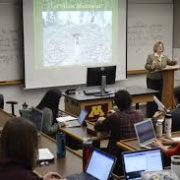Shakespeare offers this view through young Juliet in Romeo and Juliet: “What’s in a name? That which we call a rose, by any other word, would smell as sweet.”
Words, those cumbersome things that are our main line of communication with others of our species, have a primary meaning and perhaps one or more secondary meanings. They also come in and out of fashion, such as the word hidebound.
Some words, like derogatory racial ones, are frowned on by most of society but have been replaced with code words. Words like faggot have been given a new and unacceptable usage. When used to describe a person, disabled is still being fought over, and a word like niggardly carries an unfortunate history and is banned from polite society forever.
But words are the vehicles with which we communicate because they carry meaning. They can be delightful, provocative, mean, and helpful. Mark Twain writes, “The difference between the almost right word and the right word is a large matter. ’tis the difference between the lightning bug and the lightning.”
January, the month I write, is a time of lists, such as the usually ill-fated New Year’s Resolution list composed in a fever of desire for personal improvement. Or the list of the best of anything from the past year, such as the ten best novels. But any list is subject to sharp criticism and revision.
However, this truth did not prevent Stanford University from publishing this past December a list of “racist, violent and biased language” in Stanford websites and code. Immediately, Stanford was attacked for suggesting that such words as “American,” “grandfather,” and “brave” be removed. Furthermore, while Stanford is not the only college or university to attempt to remove harmful words from its official communications, it was quick to remove the list from its website.
If Stanford’s efforts prove nothing else, they prove the power of words, and some words need to be removed from public discourse. However, as young Juliet says, a word is what it is and carries its meaning(s) regardless of our efforts. And when we misuse words, we lie with intent or show our ignorance.
Pundits have had fun with Stanford’s list of what it views as offensive words, and I encourage the reader to view the reasoning for asking that such words as “American” be removed. With that in mind, I share the following paragraph from the article by Susan D’Agostino in the Chronicle of Higher Education, “This website contains language that is offensive or harmful,” a Stanford University Elimination of Harmful Language Initiative website stated in December. “Please engage with this website at your own pace.”
I understand the paragraph until that last word—“pace,” I can’t wrap my head around what Stanford is warning me of that requires me to read “at my own pace.” What other pace would I use but mine? An offensive word offends at any pace. The usage confuses me, and I wonder if this is an example of a deemed offensive word being replaced with “pace.” Risk comes to mind, as does hazard or danger, so perhaps those words carry some offense or harm to a reader.
Hurtful, mean, and nasty words have no place in the public domain unless in a context such as literature. I support their removal; however, how far do we go in our best intentions to prevent someone from being slighted or hurt, or even harmed?
That rose of Juliet will smell sweet no matter what we call it, and mean-spirited, ignorant people will remain on the earth in our midst. Perhaps we need to recognize their presence without accepting it.



